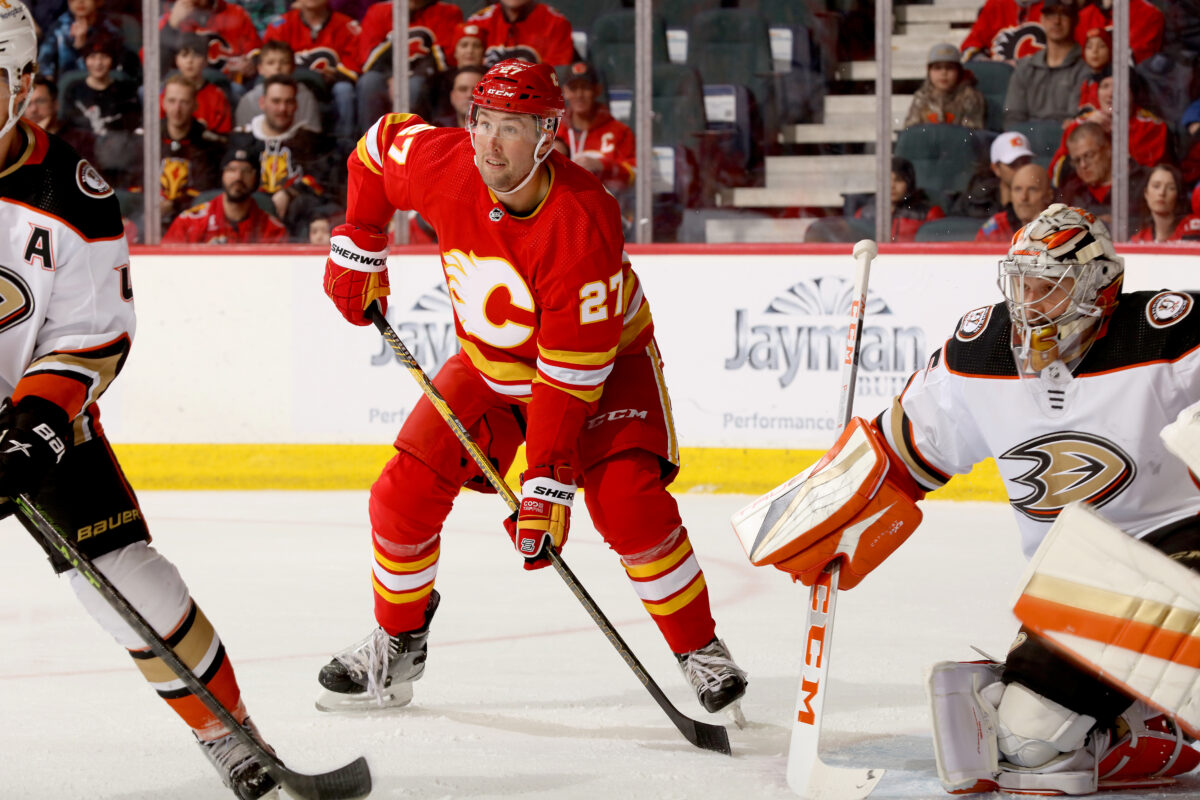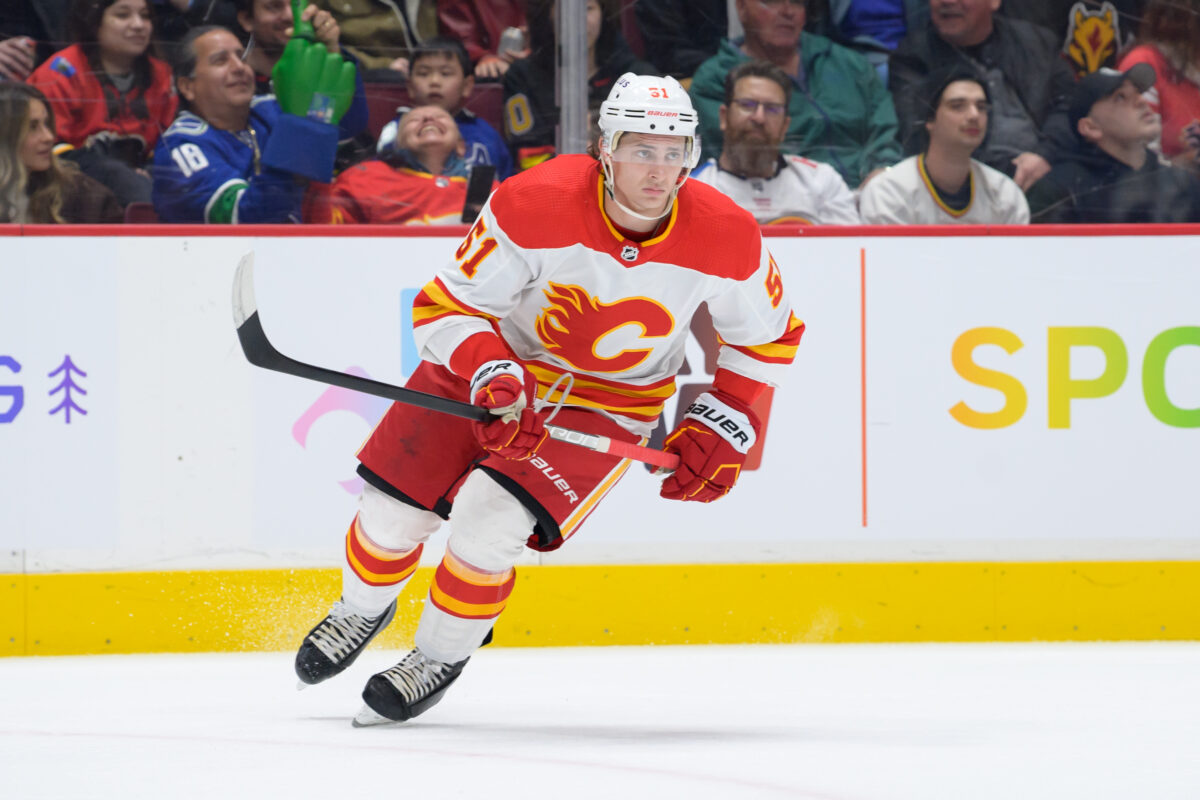It is now April, and the NHL’s regular season is nearing its end. The Calgary Flames are still in the thick of the playoff race as they are within reach of the Western Conference’s final wildcard spot with just two games left to go. To aid their push, the team didn’t do much from a transactional standpoint before the March 3 trade deadline. General manager Brad Treliving and company made just two moves: swapping minor-leaguers Radim Zohorna and Dryden Hunt followed by the trading of roster players Brett Ritchie and Connor Mackey to the Arizona Coyotes for Troy Stecher and Nick Ritchie, Brett’s brother.
Related: Analyzing the Flames’ Deadline Day Trade for Dryden Hunt
Now over a month later, fans and media alike have gotten a solid look at the two newest Flames and what each individual brings to the table. Both are probably much happier being able to play on a competitive team rather than in the midst of a rebuild with the Coyotes. In addition, each player is an unrestricted free agent at season’s end and could do well for themselves financially with a strong finish. Let’s look at how each of them has performed as a Flame, as well as their future outlook as a member of the team.
Nick Ritchie
One of the biggest players in the league at 6-foot-3 and 236 pounds, Orangeville, Ontario’s Nick Ritchie was drafted to be the prototypical gritty power forward. That was back in 2014 when the Anaheim Ducks selected him 10th overall. Now 27 years of age, the Flames are his fifth NHL team joining the Coyotes, Toronto Maple Leafs, Boston Bruins, and the Ducks. This season split between the Coyotes and Flames he has 13 goals and 13 assists in 73 games, including four goals and an assist in 15 games in Calgary. He has provided a solid physical force up front with 46 hits in those 15 games, which would equate to a total of 251 over a full season. He has also used his large frame to block a respectable seven shots, and does a good job protecting the puck with only two giveaways thus far.

Unfortunately, Ritchie is a bit of a liability defensively as evidenced by his minus-5 rating with the Flames and minus-20 overall. Despite playing predominantly in the top six, each of his line combinations has been outscored at even strength. He does provide a nice net-front presence on the second power play unit, but even then has only been on the ice for three Flames goals and two shorthanded goals against. He is likely better suited for a bottom-six role, and could effectively replace Milan Lucic after this season. Both are free agents and play similar roles, but Lucic is 34 years old compared to Ritchie at 27. His current $2.5 million contract is likely too rich but if he were to accept a cheaper deal for one or two years, the Flames would likely be happy to keep him.
Troy Stecher
Next up is 29-year-old defenseman Troy Stecher who hails from nearby Richmond, British Columbia. Just like Ritchie, the Flames are the fifth NHL team to employ Stecher. He formerly spent time with the Coyotes, Los Angeles Kings, Detroit Red Wings, and the Vancouver Canucks, who signed him as an undrafted free agent back in 2016. A two-way defenseman by nature, he is adept at making a strong first pass out of his defensive zone and getting his teammates good looks, but also hustles without the puck and breaks up a multitude of offensive chances. With the Flames, he has recorded two goals and four assists in an almost exclusively bottom-pair role averaging just 14:30 of ice time a night. He has amassed an impressive 55.9% Corsi For rating, meaning when he is on the ice the Flames control the puck more often than not.

Stecher also gets in the way of shots, blocking seven so far and 92 total this season. Of his two goals, one was a game-winner that came back on March 21 against the Ducks. It’s interesting to note that he didn’t score and had just seven assists in 61 games with the Coyotes, but with his current pace on the Flames, he’d have a career-high 27 points over 82 games. Coach Darryl Sutter has trusted his offensive prowess, starting him in the offensive zone for almost 70 percent of his shifts. At half of Ritchie’s aforementioned salary ($1.25 million), he is providing tremendous value for the Flames. With regular bottom pair defender Michael Stone experiencing health issues and Oliver Kylington still without a return date, it could be a good idea for management to work out a deal with him for another year or two.
To end off, it seems the Flames made out quite well from their deadline-day deal. Ritchie and Stecher haven’t lit the league on fire by any means, but have provided solid value and made decent cases for the team to re-sign one or both of them in the offseason. They have helped the team remain competitive in a time where each game has playoff implications, and have both experienced playing in Canadian hockey markets before.